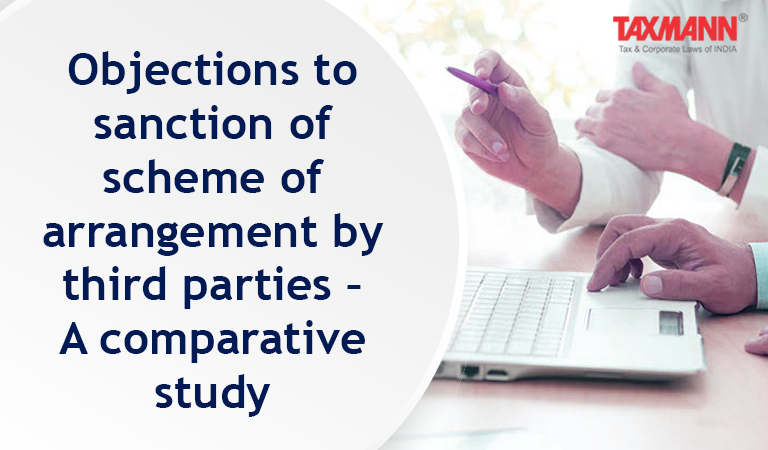Objections to sanction of scheme of arrangement by third parties — A comparative study
- Blog|News|Company Law|
- 2 Min Read
- By Taxmann
- |
- Last Updated on 7 September, 2021

[2021] 130 taxmann.com 49 (Article)
The restructuring of a company or a group of companies by means of a scheme of arrangement/amalgamation may raise the possibility of abuse if the restructuring is sought to be imposed on dissenting stakeholders. This is of particular concern where the scheme confers major benefits on the company by excluding possible claims or contingent debts. In India, under section 230 of the Companies Act, 2013 (“Act”), a third party was usually not permitted to file an objection to a scheme even if some of his rights are affected as a consequence of the scheme. This was on the premise that such a third party did not possess the requisite locus standi to question or raise any objections before the National Company Law Tribunal but only before other appropriate forums. For instance, in Sequent Scientific Ltd. In re., the objection to a scheme of amalgamation by an intervener who had an agreement of supply with the transferor company was not entertained as he was neither a shareholder of the companies involved nor their creditor.
However, now exists no clarity on whether a third party is permitted to raise an objection in such cases as a consequence of the judgment in Y. Shivram Prasad v. S. Dhanapal, and subsequent introduction of the amendment dated July 25, 2019, to the Insolvency and Bankruptcy Board of India (Liquidation Process) Regulations, 2016. By means of the judgment in Y Shivaram Prasad (supra), the National Company Law Appellate Tribunal (“NCLAT”) has permitted third parties to propose schemes of arrangement even though the statutory provision itself did not explicitly permit them to do so. Further, in SREI Infrastructure Finance Ltd. v. Sundresh Bhatt, the NCLAT has held that if the corporate debtor were to be saved during the liquidation proceeding pursuant to section 230 of Act or if it is sold to a third party along with the employees then, in such a case, an aggrieved party such as the landlord may move before the competent Court of law for appropriate decision.
It would, thus, follow that such third parties who are entitled to propose schemes may also object to the same. However, with a lack of any statutory guidance, it is not clear if this would affect the right of third parties under the Act with respect to cases that do not involve the Insolvency & Bankruptcy Code, 2016. Outside India, however, third parties have been permitted to question such schemes of arrangements/amalgamations. For instance, in the UK, third parties can seek to challenge the proposed scheme at the sanction hearing Halcrow Holding Ltd., In re. This article seeks to trace the law outside India on the issue of third-party rights.
Click Here to Read the Full Article
Disclaimer: The content/information published on the website is only for general information of the user and shall not be construed as legal advice. While the Taxmann has exercised reasonable efforts to ensure the veracity of information/content published, Taxmann shall be under no liability in any manner whatsoever for incorrect information, if any.

Taxmann Publications has a dedicated in-house Research & Editorial Team. This team consists of a team of Chartered Accountants, Company Secretaries, and Lawyers. This team works under the guidance and supervision of editor-in-chief Mr Rakesh Bhargava.
The Research and Editorial Team is responsible for developing reliable and accurate content for the readers. The team follows the six-sigma approach to achieve the benchmark of zero error in its publications and research platforms. The team ensures that the following publication guidelines are thoroughly followed while developing the content:
- The statutory material is obtained only from the authorized and reliable sources
- All the latest developments in the judicial and legislative fields are covered
- Prepare the analytical write-ups on current, controversial, and important issues to help the readers to understand the concept and its implications
- Every content published by Taxmann is complete, accurate and lucid
- All evidence-based statements are supported with proper reference to Section, Circular No., Notification No. or citations
- The golden rules of grammar, style and consistency are thoroughly followed
- Font and size that’s easy to read and remain consistent across all imprint and digital publications are applied



 CA | CS | CMA
CA | CS | CMA
